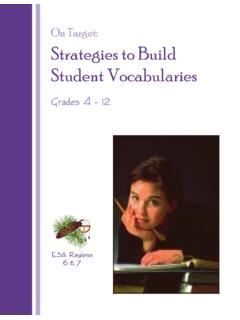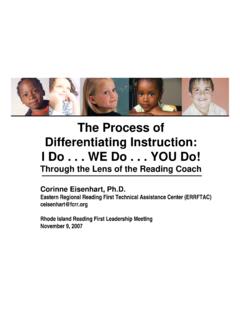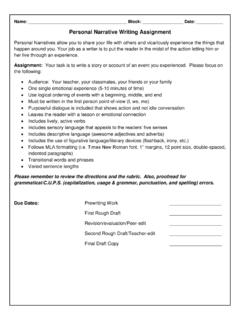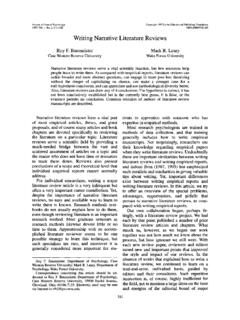Transcription of Writing Simple Sentences - University of Mississippi
1 Writing Simple Sentences SKILLS LESSON. Practice the Skill 10 15 minutes Background Step 1: Write the following Sentences on Simple Sentence sentence strips: The ball is round. My cat likes A Simple sentence contains a subject and a predicate. It is the basis of all good Writing . to sleep. Pat jumps in the pool. Cut the sentence The subject is who or what the sentence strips into their subject and predicate. Place is about. the subjects and predicates in random order The predicate tells something about the in a pocket chart or along the chalkboard subject or what the subject did. ledge. (Example: The girl runs through the park.)
2 Subject predicate Step 2: Ask volunteers to choose a subject and predicate to create a sentence that makes Teach the Skill 5 minutes sense. Have them read their Sentences aloud. Pose the following question: What did you Ask the remaining students to identify the eat for breakfast today? Select a volunteer to subject, the predicate, and whether the tell what he/she had for breakfast. Write Sentences make sense. the following Sentences on the board or Give each student a sentence strip. Have overhead: (Name) eats (name of food). them write a sentence with a subject and Create a two-column chart on the board predicate.
3 Ask students to circle the subject or chart paper with the headings Subject and underline the predicate in their sentence. and Predicate. Circle the name of the student Invite students to read their sentence aloud. and explain that this is the subject of the Explain to students that good writers are sentence. Point out that the subject is a careful to use complete Sentences in Writing . person, place, or thing that tells who or what the sentence is about. Apply the Skill (independent). Invite students to name other person, Introduce, explain, and have students place, and thing subjects (Mom, Mrs.)
4 Jones, the complete the Simple Sentences Worksheet. beach, a cat, the bird). Write each subject on the Provide instructions and allow time for chart under the heading Subject. students to complete the sheet independently. Check responses as a group. Draw a line under the phrase eats (name of food) and explain that this is the predicate of the sentence. Point out that the predicate tells more about the subject or what the subject did. More Background A Simple sentence can be long and descriptive. Invite students to identify a predicate for Using adjectives and adverbs can provide more each subject on the chart.
5 Read each subject- information about the subject and/or the predicate pair together in a sentence. Ask predicate. (Example: The long-legged girl quickly runs students if what they heard makes sense. through the small park.). Explain that every complete sentence has both a subject and a predicate. Build on the Skill (optional). Once students master Simple Sentences , model adding adjectives and adverbs to Sentences to make them more interesting. ProQuest Information and Learning Company All rights reserved. LEVELED READER F. Scaredy Crow A Reading A Z Level F Leveled Reader Scaredy Crow Visit for thousands of books and materials.
6 Scaredy Crow Scaredy Crow Written by Level F Leveled Reader 2005 ProQuest Learning Page Illustrated by Chris Baldwin Correlation ReadingA ZTM LEVEL F. ProQuest LearningPage Fountas & Pinnell F. All rights reserved. Reading Recovery 9 10. DRA 10. 3 4. 5 6. 7 8. 9 10. 11 12. PHOTO PROMPT: COMMON PHOTO PROMPT: COMMON. PHOTO PROMPT: COMMON PHOTO PROMPT: COMMON. PHOTO PROMPT: COMMON PHOTO PROMPT: COMMON. ProQuest Information and Learning Company All rights reserved. I never thought .. TEXT PROMPT: COMMON. I worked so hard that .. TEXT PROMPT: COMMON. I always wanted .. TEXT PROMPT: COMMON. I wish I was.
7 TEXT PROMPT: COMMON. I was finally .. TEXT PROMPT: COMMON. ProQuest Information and Learning Company All rights reserved. a mother a father CHARACTER CARD: COMMON CHARACTER CARD: COMMON. a grandmother a grandfather CHARACTER CARD: COMMON CHARACTER CARD: COMMON. a brother a sister CHARACTER CARD: COMMON CHARACTER CARD: COMMON. ProQuest Information and Learning Company All rights reserved. needs to get needs to deliver some food a package PLOT CARD: COMMON PLOT CARD: COMMON. has to move needs to settle a huge box a fight PLOT CARD: COMMON PLOT CARD: COMMON. needs to read wants to start a book a band by tomorrow PLOT CARD: COMMON PLOT CARD: COMMON.
8 ProQuest Information and Learning Company All rights reserved. in a city in a suburb SETTING CARD: COMMON SETTING CARD: COMMON. in a valley in a village SETTING CARD: COMMON SETTING CARD: COMMON. in a forest in a desert SETTING CARD: COMMON SETTING CARD: COMMON. ProQuest Information and Learning Company All rights reserved. Personal narrative Writing LESSON. Overview Key We believe that the common characteristics of a personal narrative should be taught in much the Beginning (grade 1). same way to all students. With this in mind, we Early Developing have provided you with a generic lesson suitable (grade 2).
9 For use with all writers. Developing (grade 3). Fluent (grades 4 6) The six-part lesson, which takes approximately two Pair or group activity weeks to complete, provides whole-class instruction for teaching and modeling of skills. The last four parts of the lesson provide guidelines for students to independently apply what they have learned. However, we recognize that not all students are at the same developmental level of Writing . Therefore, the lesson contains leveled tips in the sidebars to help you decide how to best adapt the lesson to meet the needs of each of your students. To further support students, each student resource that accompanies the lesson is written at four developmental levels.
10 These resources are marked with a , , , or to designate their developmental level. You should select a resource level on the basis of each student's needs. Pre-Teaching Tips Reading good examples of personal narrative is a powerful B efo r way to model good Writing skills before students engage in t h is e b e g i n n le s s o ing their own Writing of personal narrative . We encourage you rev ie n, w: to expose your students to many examples of personal first- narratives before beginning this lesson. pers poin on t of view Samples of personal narratives are found under RAZ Book Connections and in the following book list: Love You Forever (Robert Munsch).







